Note: As we’re still away at the mega gaming convention marathon known as Gen Con 2016, we today’s Monday Magic is the first in a four part article series on the etiquette of playing Commander and a repudiation of the notion that it should be made more competitive to satisfy the desires of the aggressive gameplay faction who prefer that style of Magic. It was originally posted on 6/30/14.
“It’s perfectly fine to be an individual, so long as you do it like everybody else.”
You’ve probably come across this phrase, or one of the dozen of other ways it can be said, but the premise remains that being individually-minded is actually far more difficult than it may seem. Whether it’s a result of class, culture, income, region, or anything else, moving to the beat of your own drum isn’t as easy as you’d expect. It’s far more nuanced – and more subjective – because one has to wonder where the idea of individual expression ends and subcultures begin. Few would argue that riding a bicycle to Starbucks so you can sit there on your MacBook is being a true individual any more than deciding this is the year you’ll pile the kids into the SUV for the car trip to Disney World.
Think about it: is shopping at Hot Topic really any more “unique” than shopping at Abercrombie?
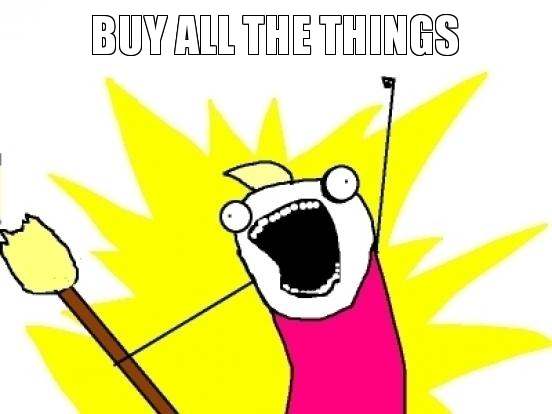
Not so subtle.
True individual expression is hard to define because there are hundreds of outside influences acting on a person leading up to any decision. Take advertising. It can be incredibly overt: you see giant billboards and TV ads for you to buy things daily. But advertising often also passes on cues that are subliminal in nature, subtlety influencing your perception of how things around you should work.
For instance, most ads show young, attractive people being happy and having a good time, not because people stop existing at 30, but because they want viewers to associate their product with those ideas. Even if an ad doesn’t ultimately make you want to buy more of their product, it can still create a lasting effect, as with enough repetition you’ll start making unconscious connections between attractiveness, happiness, and success.
The same is true when it comes to playing Magic. Like all CCGs, playing Magic: the Gathering isn’t merely sitting with your friends around the table. Instead, you must first craft and construct a deck to use. Over time, the cards you use and decks you build begin to reflect your own personal play style.
Or, at least that’s what should happen.
Yet just like the search for personal individual expression, many players fall prey to the influences of the game’s surroundings. Namely, the overwhelming desire to win at all costs. Whether it’s Netdecking (the process of copying a successful tournament deck from the Internet), fine-tuning your deck to a point where it behaves exactly the same every time, or selecting only the most powerful and potent cards around, the compulsive desire to not only win – but win in the most effective way possible – is hard to shake.
 Unfortunately, there are only so many points you can put into making a Magic deck. The more you focus on honing the lethality of your deck, the less room there is for individual tailoring. In a sense, winning at all costs becomes a player’s identity.
Unfortunately, there are only so many points you can put into making a Magic deck. The more you focus on honing the lethality of your deck, the less room there is for individual tailoring. In a sense, winning at all costs becomes a player’s identity.
That’s hardly being unique. Like subliminal advertising, winning is alluring, intoxicating, and sexy, and part of everyone wants to buy into that narrative. With tournament players, this is expected. Winning is sort of the point of a tourney play, after all. But if you’re at the kitchen table in a casual multiplayer setting, there’s no honor in brutalizing your little brother, or your boyfriend’s neighbor, or your friend who hasn’t heavily played since Ice Age. Winning is fine, but winning at any cost is not.
Unsurprisingly, being a prick is common occurrence in the multiplayer environment – especially in Commander.
So, I’m here to help. Over the next few weeks, I’m going to illuminate four areas that you should be mindful of when building your Commander deck. Not only will it help you maintain some perspective that you’re playing a game that offers tremendous room for personal expression, but my hope is that it’ll also help you avoid constructing decks that’ll just end up making you look like an asshole.
Lesson One: Overused Commanders
The first lesson is one I guarantee every Commander player has had experience with: the overused Commander. There are about 540 legendary creatures currently allowable in the Commander format. Given that each of those creatures are based around a 99 card deck, the amount of creative space this offers players is mindbogglingly huge.
However, odds are you’ve seen less than a quarter of them in your local play group.
The reasons vary. For one, some creatures are old and hard to find. Others could be cost-prohibitive. By and large, though, the most common cause is ease of access. The EDH format is still relatively new, and many players are far more likely to construct their first few decks with legends that are visible in trade binders and store shelves. Considering Wizards has been spitting out about 25 new legends a year lately, that’s more than enough choice to give neophyte EDH players a starting point. Sure, their second or third Commander deck may be a Zuberi, Golden Feather or a Hanna, Ship’s Navigator, but it makes sense that your first choice is going to be one right in front of you.
The other major reason players pick a Commander is power level. And that’s where we start running into trouble.
Let’s face it: not all legends are created equal. Some are simply underpowered, while others require substantial effort to unlock their potential. Why use Norin the Wary when you can have Kiki-Jiki, Mirror Breaker? Why pick Sol’kanar the Swamp King when Thraximundar is available?
No one is advocating to choose a worthless Commander. Rather, the problem is far too many people forgo choosing Commanders – even newer ones – based on flavor or theme. Instead they choose the ones that throw the heaviest punches or becomes broken with one-sided combos.
What sort of Commanders are we talking about? Well, there are a decent amount to choose from, but let’s take a look at just a few:
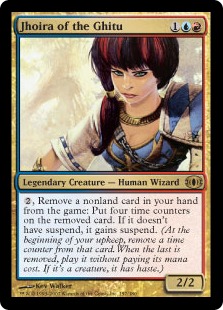
Jhoira of the Ghitu
“At the end of your turn, I suspend Time Stretch, Darksteel Colossus, and Insurrection…”
We get it. Casting ridiculously large things for cheap is fun, but dropping down game-ending cards on turn six isn’t. If you want a six-turn win, go play a different format. For most of us, it’s down right annoying. All you’re doing is finding the biggest, meanest cards in her colors you can and making a deck out of it.
Guess what? That’s the exact same thing everyone else does.
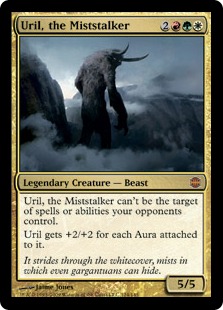 Uril, the Miststalker
Uril, the Miststalker
“I believe that’s 82 Commander damage…”
Remember when people complained because a hexproof unblockable 1/1 was problematic? How about a hexproof Commander that comes out quickly and gets buffed really, really quickly?
I mean, kudos for using Auras (an often underutilized card type in Commander), but the moment you get Uril out, you’re giving him trample and/or vigilance. Oh, Rancor? No, of course I didn’t see that coming.
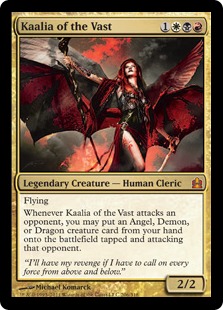 Kaalia of the Vast
Kaalia of the Vast
“What? It’s ok. She was in a precon….”
You have to laugh when the Commander Rules Committee goes and bans certain cards for accelerating the game too quickly, and one of Wizard’s first cards designed specifically for Commander is another one of those creatures.
Another Jhoira type. Oh look, at least one person in this game on turn five doesn’t have a flier, so they’re getting attacked with a 2/2 and…some other giant monstrosity that everyone now has to deal with.
Anytime your games revolve around having to constantly shut down one Commander, you have a problem. And no, attacking with Kaalia and dropping out Master of Cruelties isn’t you being creative. It’s you being a dick.
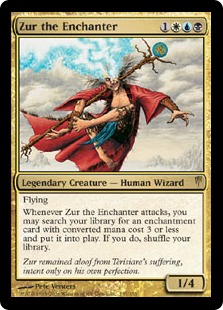 Zur the Enchanter
Zur the Enchanter
“I’m sure I have an answer in here somewhere…”
Zur, a.k.a. one of the go-to Commanders for the tournament-minded combo players. Zur bears a lot of the same hallmarks – and problems – of Kaalia. Except unlike dropping out other giant creatures, Zur just puts out aggravation. You either have to keep this guy locked down, or the deck he’s centered around will become increasingly frustrating.
I’m going to guess how this will turn out. His first attack will make him hexproof. His second will protect all of your other enchantments. His third…well by now either everyone has lost interest or are desperately trying to find some kind of effective board wipe.
Boy does that sound fun!
I love wacky card combos and utility creatures myself, but even I find Zur annoying.
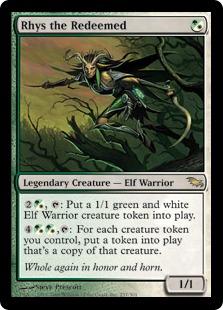 Rhys the Redeemed
Rhys the Redeemed
“Anyone know what 142 times four is?”
One of the cheapest mana costs for a Commander around, Rhys certainly makes his way into a small amount of Green / White token decks.
Just kidding. He makes his way into all of them. Because he’s that good. Even if you kill him, he’s so cheap that he’ll just be back out again in short order. He’s like some kind of elven parasite.
With his ability to plop out 1/1 tokens early and a built-in Parallel Lives on tap, he can get out of hand quickly in any sort of token-making setting.
But you can’t resist putting out an actual Parallel Lives or Doubling Season, can you? Like Kerrigan, the swarm calls to you with this card, and you just have to make a bad thing worse.
Fun fact though: there’s a little known rule that anyone who faces a Rhys and a Coat of Arms at the same time is required to actually flip the table.
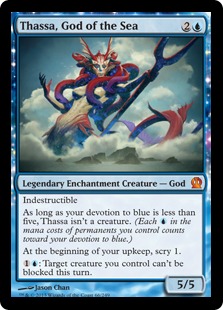 The Theros Pantheon
The Theros Pantheon
“And now that it has devotion…“
Some may consider this an early claim, but it’s evident that several of the Gods are already being a nuisance (Purphoros, Erebos, Athreos). If you don’t have devotion, you get indestructible enchantments for cheap, and once you do have devotion, you have creatures just looking to cause havoc.
Yay.
At least with Avacyn, Angel of Hope, Ulamog, the Infinite Gyre, and the Myojin you have to pay high casting costs to get out that kind of firepower. Most of the Gods come at bargain mana costs.
So, they’re affordable, abusable, and can survive board wipes. What could possibly go wrong?
Really, these are the types of creatures that you simply don’t mind going all Bant Charm on…
All of these Commanders have two things in common. First, they are very powerful as Commanders. Their presence on the board alone is enough for concern, drastically altering the course of the game. In many cases, an overpowered Commander becomes a game within a game of how players are going to have to handle them. If you’re trying to make a deck that won’t be seen as throwing its weight around, this should be a red flag to you.
The second thing is that they need not be on this list. Really. Many overpowered Commanders are only overpowered because of what people combo them with. If you’re set on using some of these top tier legends you should, you know, maybe kinda consider not putting in all of the cards that make them so frustrating to begin with. It’s a strange idea for the more aggressive players of the gaming world, I’m sure, but if you want to have a Jhoira deck that doesn’t make people want to smack you, reign it in a little bit.
At the end of the day, Commander is supposed to be a casual, multiplayer setting. Just because you can put in the most broken, overpowered Commanders and the card that sets them into some sort of infinite whatever, it doesn’t mean you have to. Case in point: the next deck I’m working on revolves around Ramses Overdark. He’s hardly the most cost-effective Commander around, doesn’t quite instill fear of going infinite, and he still can’t do much without cards to help him. If I were set on an efficient killing machine for a Commander, I easily could just go with a Visara the Dreadful. But where would the fun in that be?
Magic is still a game, after all, and games are about fun. Few games offer you the chance to express your individual preferences from within the game itself like this one does, and that’s doubly so for Commander. By only utilizing the most powerful Commanders and the cards that enable them, however, you miss out on an entire aspect of what the format offers.
In the next segment, we’ll explore the issue of these combos. Until then, may your Commander be incapable of six-turn wins.
![]()
Do you have a Commander your group deems overpowered. Tell us over on our social media or by contacting the author at ryan@cardboardrepublic.com
